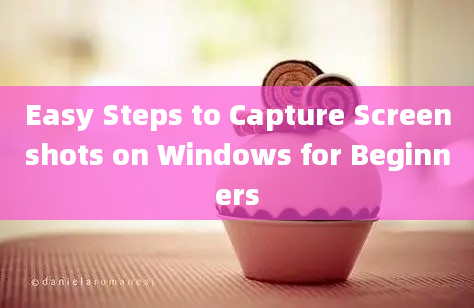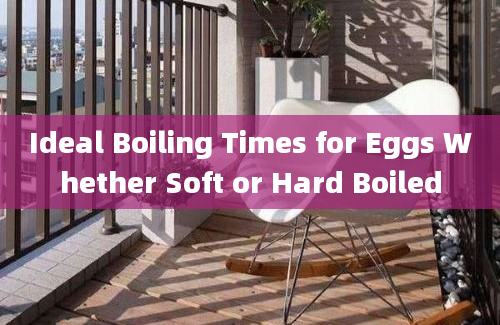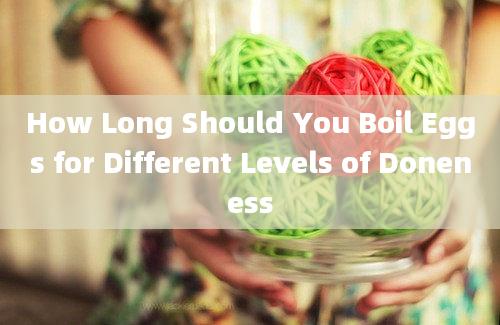The Ultimate Guide to Perfectly Boiled Eggs and Cooking Times

Boiled eggs are a staple in many diets, offering a versatile, nutritious, and delicious option for breakfast, lunch, or dinner. However, achieving the perfect boiled egg can be a bit tricky, as the ideal texture and doneness vary depending on individual preferences. This comprehensive guide will walk you through the science and techniques behind boiling eggs to perfection, backed by authoritative sources.
Understanding Egg Composition
Eggs consist of three main parts: the shell, the egg white (albumen), and the egg yolk. The albumen is mostly protein, while the yolk contains fats, vitamins, and minerals. The key to perfectly boiled eggs lies in understanding how these components react to heat.
Factors Affecting Boiling Time
1. Egg Size: Larger eggs take longer to cook than smaller ones.
2. Starting Temperature: Eggs taken directly from the fridge will take longer to cook than those at room temperature.
3. Water Temperature: The initial temperature of the water can affect cooking time.
Recommended Boiling Times
According to the American Egg Board, here are the recommended boiling times for different levels of doneness:
SoftBoiled Eggs: 57 minutes
MediumBoiled Eggs: 79 minutes
HardBoiled Eggs: 912 minutes
StepbyStep Guide to Boiling Eggs
1. Prepare the Eggs:
Place the eggs in a single layer at the bottom of a saucepan.
2. Add Water:
Cover the eggs with cold water by about an inch.
3. Heat the Water:
Bring the water to a rolling boil over high heat.
4. Start the Timer:
Once the water reaches a boil, reduce the heat to maintain a gentle boil and start your timer.
5. Cook the Eggs:
Cook for the desired time based on your preference (soft, medium, or hardboiled).
6. Cool the Eggs:
Immediately after the timer goes off, transfer the eggs to an ice bath to stop the cooking process.
Tips for Perfect Boiled Eggs
Use Older Eggs: Older eggs are easier to peel. Fresh eggs tend to stick to the shell.
Peel Under Running Water: Peeling eggs under running water can help the shell come off more easily.
Avoid Overcooking: Overcooked eggs can develop a greenish ring around the yolk, which is harmless but unappetizing.
Scientific Insights
The Maillard reaction, a chemical reaction between amino acids and reducing sugars, can cause the green ring in overcooked eggs. According to a study published in the Journal of Food Science, this reaction occurs at temperatures above 158掳F (70掳C).
Common Questions and Answers
Q1: How long should I boil eggs for softboiled eggs?
A1: Boil eggs for 57 minutes for softboiled eggs, where the whites are set but the yolks are still runny.
Q2: What is the ideal boiling time for mediumboiled eggs?
A2: For mediumboiled eggs, with a slightly firm yolk, boil for 79 minutes.
Q3: How long do I need to boil eggs for hardboiled eggs?
A3: Boil eggs for 912 minutes for hardboiled eggs, where both the whites and yolks are fully set.
Q4: Should I start with cold or hot water for boiling eggs?
A4: Start with cold water to ensure even cooking and prevent cracking.
Q5: Why do my eggs crack when boiling?
A5: Eggs can crack due to rapid temperature changes. Starting with cold water and avoiding a rapid boil can help prevent cracking.
Q6: How can I make boiled eggs easier to peel?
A6: Use older eggs and peel them under running water to make the process easier.
Q7: What causes the green ring around the yolk of hardboiled eggs?
A7: The green ring is caused by the Maillard reaction, which occurs when eggs are overcooked.
Q8: Can I boil eggs straight from the fridge?
A8: Yes, but they may take slightly longer to cook. Allow them to sit at room temperature for a few minutes if possible.
Q9: Should I add salt or vinegar to the water when boiling eggs?
A9: Adding a pinch of salt or a teaspoon of vinegar can help prevent egg whites from leaking out if the shell cracks.
Q10: How do I store boiled eggs?
A10: Store boiled eggs in the refrigerator in their shells for up to a week. Peeled eggs should be eaten within a few days.
References
[American Egg Board](https://www.incredibleegg.org/)
[Journal of Food Science](https://ift.onlinelibrary.wiley.com/journal/1750)
By following this ultimate guide, you can achieve perfectly boiled eggs every time, tailored to your preferred level of doneness.
Common Questions and Detailed Answers
Q1: How long should I boil eggs for softboiled eggs?
A1: For softboiled eggs, where the whites are set but the yolks remain runny, you should boil the eggs for 57 minutes. This short cooking time ensures that the yolks do not fully solidify, providing a creamy texture.
Q2: What is the ideal boiling time for mediumboiled eggs?
A2: The ideal boiling time for mediumboiled eggs, where the yolks are slightly firm but still a bit soft, is 79 minutes. This duration allows the yolks to thicken without becoming completely hard.
Q3: How long do I need to boil eggs for hardboiled eggs?
A3: To achieve hardboiled eggs, where both the whites and yolks are fully set, you should boil the eggs for 912 minutes. This longer cooking time ensures that the yolks are completely solidified.
Q4: Should I start with cold or hot water for boiling eggs?
A4: It is best to start with cold water when boiling eggs. Placing eggs in cold water and then bringing the water to a boil helps prevent cracking and ensures even cooking.
Q5: Why do my eggs crack when boiling?
A5: Eggs can crack when boiling due to rapid temperature changes. Starting with cold water and avoiding a rapid boil can help minimize thermal stress on the eggshells, reducing the likelihood of cracking.
Q6: How can I make boiled eggs easier to peel?
A6: To make boiled eggs easier to peel, use older eggs, as they tend to have a larger air cell and looser membranes. Additionally, peeling the eggs under running water can help the shell come off more easily.
Q7: What causes the green ring around the yolk of hardboiled eggs?
A7: The green ring around the yolk of hardboiled eggs is caused by the Maillard reaction, a chemical reaction between sulfur in the egg whites and iron in the yolk, which occurs at high temperatures. Overcooking the eggs leads to this discoloration.
Q8: Can I boil eggs straight from the fridge?
A8: Yes, you can boil eggs straight from the fridge, but they may take slightly longer to cook. If possible, let them sit at room temperature for a few minutes before boiling to reduce cooking time.
Q9: Should I add salt or vinegar to the water when boiling eggs?
A9: Adding a pinch of salt or a teaspoon of vinegar to the water can help prevent egg whites from leaking out if the shell cracks. The salt and vinegar can help coagulate the egg whites more quickly.
Q10: How do I store boiled eggs?
A10: Store boiled eggs in the refrigerator in their shells for up to a week. If you peel the eggs, they should be eaten within a few days to ensure freshness and prevent bacterial growth.
By following these guidelines and understanding the science behind boiling eggs, you can consistently achieve perfectly boiled eggs tailored to your preferences.










